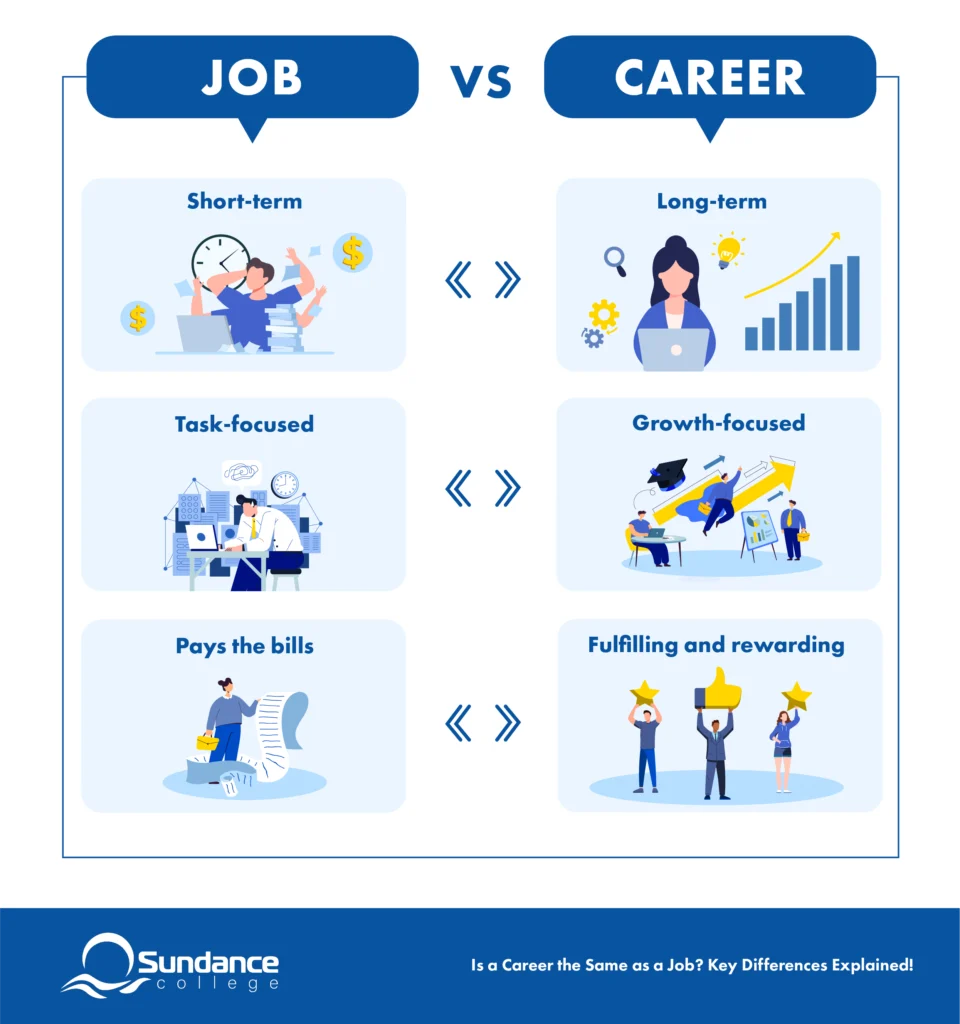Blog / Career vs Job: What’s the Difference?
Career vs Job: What’s the Difference?

Explore our Diploma Programs
- Business, Hospitality, and Legal
- Health and Human Services
- Technology
Table of Contents
Are you tired of jumping from one minimum wage job to another? It usually starts with a bit of excitement – new people, new tasks, a fresh environment. But before long, that novelty wears off, and you’re left feeling undervalued and underpaid. So, you quit, move on to another similar job, and the cycle starts all over again. But what if there was a way out of this “McJob” cycle? Well, there is, and it’s called a career!
When you invest in a career, you’re not just earning a paycheck – you’re working towards something bigger; something that aligns with your passions and goals. As career coach John C. Maxwell says, “A job is what you’re paid for; a career is what you’re made for.
So, what makes a career different from a job? Why choose a career over a job? And how to break free from your McJob cycle? Let’s explore these questions and more to help you build a successful career.
Listen to: Career vs Job: What’s the Difference?
What Makes a Career Different from a Job?
Before we look at the differences between a job and a career, let’s go through each of their official definitions, according to the Oxford English Dictionary:
- A job is a paid position with regular employment.
- A career is an occupation undertaken for a significant period of a person’s life with opportunities for progression.
Now that you have a fair idea of what a job and a career are, let’s explore the major differences between the two.
A job is suited for short-term requirements—clock in, complete the task, get paid. It’s straightforward and sometimes gets the bills paid. However, many people need to work multiple jobs to make ends meet, which can eat into their personal time and affect their work-life balance. Jobs are often about immediate needs, offering limited opportunities for growth and advancement.
On the other hand, if you seek long-term growth and success, a career is the way to go. Careers provide ongoing learning, skill development, and genuine opportunities to take on new challenges. They are more than a series of jobs; they represent a path of continuous improvement and professional fulfillment.
Need specialized training? Careers have got you covered, providing access to advanced education, certifications, and hands-on experience that turn you into an expert in your field. With a career, you’re making significant contributions and driving change, rather than just punching in and out.
But that’s not all! Careers also lead to financial security and growth. They provide structured opportunities for promotions, salary increases, and bonuses, leading to substantial wealth creation and financial independence over time. As you climb the career ladder, you gain not only monetary benefits but also job stability and long-term prosperity.
With these differences in mind, let’s explore the advantages of a career over a job.
Why Choose a Career Over a Job?

Higher Earning Potential Over Time: No matter how enjoyable your job is, it can only pay so much—a quick job is unlikely to get you a 6-figure salary, if that’s what drives you. But with a career, promotions, bonuses, and salary raises can help you reach your ultimate financial goal.
Professional Growth: Consider the potential for promotions – a career offers a clear path for advancement. Each step up the ladder brings new challenges, responsibilities, and of course, a better paycheck. It’s more than a job; it’s a continuous journey of professional growth.
Greater Job Satisfaction: Choosing a career means aligning your work with your passions. When you’re passionate about what you do, it not only pays the bills but also provides a sense of fulfillment and purpose.
Increased Job Security and Long-Term Stability: Jobs can be temporary, but careers offer job stability and career longevity. As you build expertise, your career becomes a safety net that provides peace of mind.
Networking Opens Doors to Future Opportunities: Careers come with networking perks. Building professional relationships can lead to exciting collaborations, promotions, and diverse career paths. It’s all about who you know and how you grow together.
Recognition and Impact: In a career, your efforts are acknowledged, giving you the chance to make an impact, influence your industry, and inspire others. This recognition extends beyond awards, eventually leaving a legacy. With these clear benefits outlined, you might be wondering how to make a switch from your mundane job to a promising career.
How to Break Free from Your McJob Cycle?
The best way to switch from a job to a career is through a career-focused education and training at a career college. With families to support, houses to run, and jobs to maintain, traditional college can feel impossible to attend for many people. That’s why a career college, with its flexible schedules, industry-experienced instructors, and fast-tracked training, is the perfect way to begin your career.
Career colleges are designed with working adults in mind. Many offer online courses and accelerated programs, allowing you to balance your education with your personal and professional responsibilities. These programs focus on practical, hands-on training that equips you with the skills employers are looking for, making you job-ready from day one.
Additionally, career colleges often have strong connections with local businesses and industries. This network can help you find internships, job placements, and career opportunities that align with your goals. The specialized training and diplomas you receive will make you stand out in the job market, opening doors to positions that offer growth, advancement, and fulfillment.
Investing in a career college education is a strategic move towards breaking out of the McJob cycle and stepping into a future where you’re not only working a job but also pursuing a career and building a better future for yourself and your family. A career that brings satisfaction, financial stability, and the opportunity for professional growth and personal development. So, take that step, and transform your work life from a series of jobs into a rewarding career.
How Do I Build a Successful Career?

Here’s a roadmap to get you started:
Set Clear career goals: The first step to building a successful career is knowing where you want to go. Define clear, achievable goals that align with your passions and strengths. These goals will act as your guiding star, keeping you focused and motivated as you navigate your career path and seize career opportunities.
Gain Knowledge through a career-focused training: Once your goals are set, it’s time to equip yourself with the necessary knowledge and skills. Career colleges, like Sundance College, are a fantastic option for this. With their flexible schedules, fast-tracked courses, and industry-experienced instructors, career colleges are designed to fit into your busy life and can open the door to diverse career paths, including:
- Business and Legal: If you’re interested in accounting, marketing, or paralegal studies, Sundance College offers specialized programs that provide you with the practical skills needed in the business and legal fields. These programs prepare you for roles such as business managers, bookkeepers, and legal assistants.
- Health and Human Services: If you have a passion for helping others, look at programs like addictions and community health professional, education assistant, and pharmacy assistant. These courses are designed to give you hands-on training in real-world settings, preparing you for rewarding careers in healthcare and human services.
- Technology: In today’s digital world, tech skills are highly sought after. There are programs in network systems, mobile app development, and web development. These programs are tailored to provide you with the technical skills and diplomas needed to thrive in the ever-evolving tech industry.
Gain Job Experience: Once you have your goals set and knowledge in place, the next step is gaining practical experience. Graduates from Sundance College and some other career colleges won’t need to worry about this – they’ll have competed a practicum experience within their field and will have gained the experience they need to begin their career. Other ways to get hands-on experience are through internships or volunteering. The practical exposure not only hones your skills but also makes you stand out in your field.
Build Your Network: As you gain experience, start building your professional network. Attend industry events, join professional organizations, and connect with colleagues on platforms like LinkedIn. Networking is a continuous process that can open doors to exciting collaborations, job opportunities, and valuable industry insights throughout your career.
Keep Learning: Finally, never stop learning. Keep investing in your education and skills by building a strong network of peers in your industry, attending workshops, seminars, and conferences, and continually developing your foundational skills. This proactive approach ensures you stay competitive, ready to seize new growth opportunities, and achieve career advancement.

Choosing a Career Over a Job: Why It Matters
Building a successful career is a journey filled with growth, learning, and opportunities. By choosing a career over a job, you invest in higher earning potential, professional development, job satisfaction, security, networking, and ultimately, career success.
Career training helps you develop the skills and knowledge needed to achieve your professional goals and enjoy long-term success. Ready to take the next step? Discover your potential with Sundance College’s Career Training Readiness Quiz. In just a few minutes, identify your goals, strengths, and key facts about your future career path.
Start your journey today and watch your professional life flourish, bringing you career development and achievements beyond your expectations. To get started pursuing a new career, fill out this form to connect with an admissions advisor.
Subscribe for more career advice
Blog Categories
Share on:
